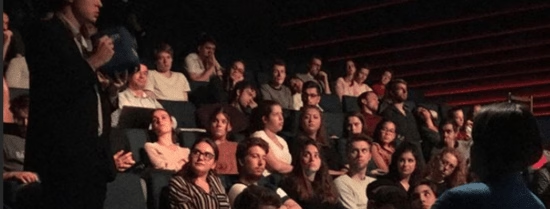Yesterday Violeta Bulc, European Commissioner for Transport, visited the campus for a ‘citizens dialogue’ with students about the future of Europe. The Commissioner -who herself came to the meeting by bike - started the discussion by stressing that she travels around a lot to a listen to what citizens have to say. And that talking to a commissioner really helps: Mrs Bulc gave the example of an EU programme that allows students to be compensated for their travel to study - Move2Learn, Learn2Move. This initiative started in a meeting just like this with a question from the audience.
The citizens' dialogue was organised by Eastern European Student Assocation EESA, SG Erasmus and the European Commission. Here are some of the questions by the audience, most of them students, and the Commissioner's answers.
Q: How to make the EU more popular?
A: Well, let me ask: how would you do it? How do you communicate with your colleagues and friends about the benefits for EU citizens? In the case of the students, do they know and talk about all the scholarships and internships that are available? We all have the duty to engage in our local communities: the good needs defenders too. I invite you all to participate.
Q: is the EU up to the tasks it is getting?
A: Over the past four years alone, we have had so many challenges: we have seen a rise in international terrorism and international migration, while multi-lateral agreements are under pressure. I personally believe the EU can deal with any challenge it will be faced with, because of its strengths. We are the biggest economy in the world, with the biggest foreign direct investment.
Q How can we make decision making process in the EU more efficient?
A: We absolutely need to innovate our democratic models. We need to reinvent democracy. You are students. Please help us to innovate democratic tools!
Q: Why is the EU not focused on high-speed rail network?
A: I would love to see railways becoming the backbone of our infrastructure for trips up to 600 kilometers. But calculations show that for now, very few high-speed lines are economically viable. But on existing networks we can get reasonable speeds already, sufficient for freight and passengers.
Q: But given the low prices of plane tickets, why do we not put higher taxes on flights?
A: That is simplification of a complex problems. It is not just about taxes. We already invested 230 billion euros in infrastructure. We are preparing states to absorb that type of investments and make green forms of transport more attractive.
Q: Should we adapt our transport needs to the planet and maybe not travel to Ibiza three times a year?
A: Decarbonisation and travel do not have to be mutually exclusive. We are aiming for zero-emission planes in 2050, with new types of propulsion systems. It will be hard, but we are trying to create stability for investors.
Q: What is the EU doing about climate challenge?
A: "This is really at the heart of everyday life of what we do in the EU. There is no other way than to invest in changes in our daily life to prepare for climate change. In a couple of weeks, we are coming out with a clear strategy what we will be doing. In transport for example, all transport means should have zero emissions by 2050. We are also investing in newer methods of CO2-storage."
The Commissioner concluded by giving the students a task: "Challenge everything I just said, debate and discuss. If we work from the heart, we can create a better future. Good luck!"

